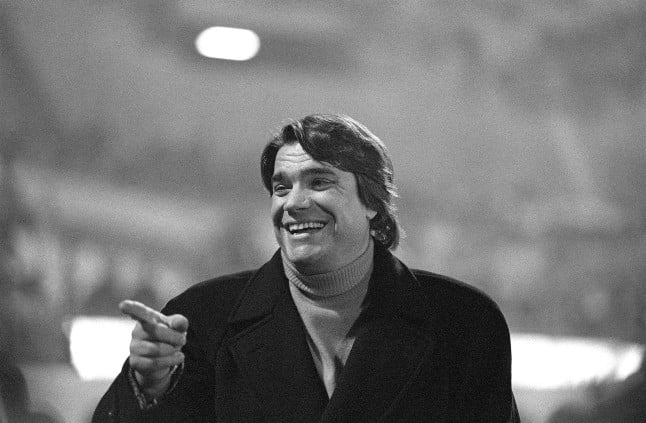His swashbuckling career spanned business, sports, politics and the arts, but also scandal and prison.
Tapie, who revealed in 2017 that he had cancer of the stomach and oesophagus, made a vast fortune, lost it and then made it back again, only to end his life broke following a scandal which embroiled Christine Lagarde, now head of the European Central Bank.
“If there is one thing I know how to do, it is making dough,” the permanently tanned tycoon once boasted.
But in 2015 he was forced to admit: “I am ruined. I haven’t got a thing.”
Like many of his flamboyant declarations, it was to be taken with a pinch of salt — although he was indeed down to his last few mansions.
Corporate raider
Born in occupied Paris on January 26, 1943, Tapie’s beginnings were modest, selling televisions by day in working class Belleville while trying his hand as a crooner by night.
But he soon ditched the singing and amassed a small empire by the time he was 30 by taking over failing companies, scooping up 50 within a few years.
In 1990 he made headlines by buying the German sportswear giant Adidas — a purchase that would later come back to haunt him.
He flaunted his wealth, buying a vast Paris townhouse and a string of mansions on the French Riviera as well as a 72-metre (236-foot) yacht.
A sports fan with a boxer’s build, Tapie also used his fortune to buy a cycling team which twice won the Tour de France.
In 1986 he purchased one of France’s most-loved football clubs, Olympique de Marseille, guiding the team to five successive league triumphs and the 1993 Champions League title.
On the back of that success he forged a political career, winning election to the French parliament in 1989 and 1993 and becoming a European Parliament deputy in 1994 after briefly serving as a minister under President Francois Mitterrand.
Disgrace
But things began to unravel for the father of four as he faced a slew of legal woes, including charges of match-fixing during his time at Marseille.
The claims tainted the team’s Champions League victory — the only time a French club has won the trophy.
Players from a smaller club revealed they had accepted bribes to take it easy on Marseille in a match before their Champions League final.
Tapie served six months in prison in 1997 for his role in the scandal, part of it in solitary confinement.
The affair led to the collapse of his business empire, and he was declared bankrupt and banned from serving as a company director or in any public office.
Bouncing back
Friends and family described him as a broken man, but his old showbiz skill helped him bounce back and turn to acting, notably in a popular TV series in which he played — with no little irony — a police inspector.
And his lucky streak seemed to have returned in 2008 when a government arbitration panel accepted he had been the victim of fraud when he sold Adidas in 1993, ruling that the brand had been undervalued.
He was awarded a compensation payout of 404 million euros ($450 million), the size of which sent shockwaves through France.
Tapie repaid his debts and was able to buy France’s Hersant publishing group, a string of properties and another yacht, which he named “Reborn”.
But the case was appealed and in May 2017 a court ordered him to hand back the payout — and he was broke again.
The saga also ensnared Lagarde, who was France’s economy minister when the panel ruled in Tapie’s favour and was accused of poorly handling the matter.
After his cancer became public, Tapie declared he would “fight like he had always done”.
“The idea of dying, it does not bother me at all,” he told Le Monde newspaper. You would need to be “crazy not to be happy with my life.”
In July 2019 he was acquitted on charges of defrauding the state in the case of the controversial arbitration. However he was not yet out of the woods as a new case was brought against him.
That trial began in May with Tapie already gravely ill in hospital and prosecutors demanding a five-year sentence and a 300,000-euro fine. Judges had been due to hand down their verdict on October 6.



 Please whitelist us to continue reading.
Please whitelist us to continue reading.
Member comments